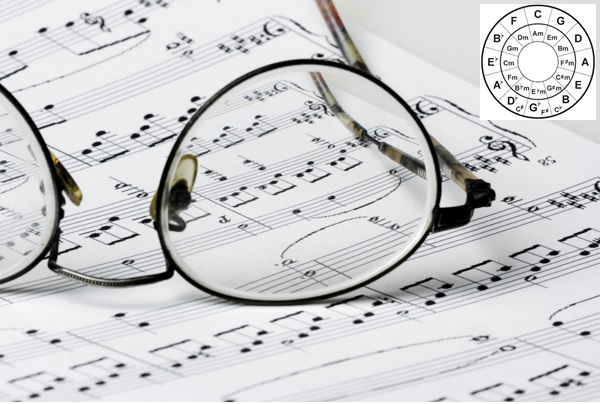
Top music theory books that will give you a better grasp over the theory behind the music that you love. There are lot of students, who despite a few years of lessons, don’t have much grasp over music theory, even though they are able to play lot of songs (only using three or four chords). These books will help you take your knowledge of music theory up several notches. You may skip to the best music theory book on Amazon.
Best Music Theory Books
There are several music students who have been playing their musical instrument (piano, guitar, etc.) for several years but still do not have a good understanding of music theory (especially the advanced topics).
Then there are students who have been learning piano and theory for several years, have completed their grade 8 exams, but do not own any music theory books (for reference, just in case you want to revisit a topic for further clarification).
Remember, music theory is a huge subject that covers many areas. To get a good working knowledge of everything takes a long time, effort and commitment.
Here, we take a look at the best music theory books available for beginners, and also for the advanced players.
Advanced Music Theory Textbooks (Recommended )
Laitz’s The Complete Musician.
Pros: Extremely thorough, good pedagogy.
Cons: Dense reading can put off some readers.
Clendinning/Marvin’s Musician’s Guide to Theory and Analysis
Pros: Thorough, easy to read (conversational writing style).
Cons: Definitions are not always clear in text, although the glossary helps solve this.
Aldwell/Schachter’s Harmony and Voice Leading
Pros: Bible for part writing. Extremely thorough; the standard text for part writing.
Cons: Doesn’t discuss much outside of part writing.
More good books:
- Harmony in Context by by Miguel Roig-Francoli
- The Musician’s Guide to Theory and Analysis – by Jane Piper Clendinning (Author), Elizabeth West Marvin (Author)
Also Read:
Recommended with reservations:
Benjamin/Horvit/Nelson’s Techniques and Materials of Music.
Pros: Good information presented in outline format. Concise and clear.
Cons: not very in-depth; few musical examples. If this kind of thing appeals to you, then great.
Turek’s Elements of Music.
The tone of this textbook is extremely conversational, also has much more jazz in it, and has some material directed at guitar players.
Not recommended:
Benward/Saker’s Music in Theory and Practice. Does not promote an understanding of concepts, but rather rote memorization.
Kostka/Payne’s Tonal Harmony. Again, does not promote an understanding of how chords work—chord function is not explicitly addressed, only chord spelling.
Books on Chords and Scales
Chords and scales are the basics of music theory. As a beginner, you may have learnt only a few chords and scales, but there are many more to be learnt.
For learning chords, a good book is The Chord Wheel, its about understanding chords and chord relationships!
For learning scales, a good book is Musical Scales of the World by Michael Hewitt.
Beginning Music Theory
Majority of music students, looking for theory textbooks, are studying music at secondary/high school level or have spent a couple of years taking music lessons, and need a theory book to help them understand music better (and to pass their exams).
Here are some more music theory books, but not as advanced as the list above.
Introduces you to several concepts, in an easy to understand manner. Perfect for hobby students and musicians.
The book will appeal to students of music and music lovers in general. The music theory for Dummies is an easy to digest book for beginners, that starts with the simplest concepts and takes you through some advanced topics as well.
The book includes essential information on how to read and write music, as well as useful hints on composing, arranging, and creating original melodies, harmonies, and chords. The book includes several practical tips/explanations to help you understand things better.
The book includes topics such as: major and minor scales, intervals, recognizing pitches and clefs; understanding rhythms, tempo, dynamics; how to transcribe music you hear and how to transpose it to other keys; how to harmonize and accompany melodies; how to compose and arrange for voices and instruments; and lot more.
Music Theory for Computer Musicians
For DJs, gigging musicians, electronic music producers, who know how to play their instruments or make music on the computer, but have limited knowledge of music theory. This book helps them take their music-making to another level. There are a lot of musicians, DJs, electronic music producers who know how to create tracks using software, but are not very good with music theory. This book is for them. The basics that are taught in this book applies to all kinds/styles of music and will help you to take your music one notch higher. See PRICE on Amazon.
The Chord Wheel: The Ultimate Tool for All Musicians: Be a better musician with this chord wheel. Understand key structure, transpose keys quickly, and lot more. No music reading is necessary.
Musimathics: The Mathematical Foundations of Music (MIT Press): Introduction to the mathematics and physics of music; essential reading for musicians, music engineers, and anyone interested in the intersection of art and science.
The AB Guide to Music Theory Vol 1
If you live in the UK, you would definitely have heard about this book, it’s the standard text for GCSE level study. It covers everything you need to pass a GCSE level music theory exam.
Learning to Read Music (How to Make Sense of Those Mysterious Symbols and Bring Music Alive): Learning to read music (by Peter Nickol) is an important skill for orchestral musicians and most session players, but perhaps not to the musician who makes music at home. But if you really want to learn to read music, this is a good book to have.
Teaching Little Fingers to Play: A Book for the Earliest Beginner by John Thompson – Wonderful first piano book for kids!
Piano & Keyboard All-in-one for Dummies by Blake Neely – Gives you a good overview on Piano/Keyboards. It is suited more for adults than for kids
The Complete Idiot’s Guide to Music Theory Book by Michael Miller. Basic theory book! comes with a CD which has listening examples and exercises
Music Theory for Practical People by Ed Roseman. It is Witty and covers all the beginner music theory basics. Can be used by all – from teens to adults
Most of these books can be found (new or used) online or at various universities for music majors.
Have any questions or feedback, or want to suggest few other books, let me know in the comment below!
Closing Thoughts
Its important for music students (learning to play instrument) to learn music theory because it helps them understand how the intervals, chords, scales and modes can be used to arrange, improvise and compose music. They can read music, create music and share their music with others. Music is all about playing a series of chord progressions, and the various chords create different moods.
Music theory helps students connect the dots and understand how something as simple as a broken major sixth chord with the left hand can become a walking bass line, and it automatically allows the student to start playing jazz or blues or any style they want. This is how you take your knowledge of music theory and apply it to making and sharing music.
It helps you sight-read better, play better with a band or group of musicians, and you can even share your knowledge with others by teaching music to others.
KeytarHQ editorial team includes musicians who write and review products for pianists, keyboardists, guitarists & other musicians. KeytarHQ is the best online resource for information on keyboards, pianos, synths, keytars, guitars and music gear for musicians of all abilities, ages and interests.



These sources look valuable. I’m 24 and have long-wanted to be a producer/musician; although I’m familiar with music production tools, I have mostly spent my years from high school being an avid listener, but an engineering-student.
As I believe my best opportunity to be successful in potentially changing my life’s path towards music is to first become familiar with musical vocabulary and underlying structures, I hope studying these materials will be fruitful. Already, I am having success with Hearing & Writing Music: Professional Training for Today’s Musician and additional books by Schoenberg, Persichetti.
I am trying to piece together education with writing/recording, while simultaneously balancing and reducing my newly-started engineering career(which I prepare to abandon).
Do you have any recommendations for drafting a curriculum? I sense these materials will be enough to get myself started, though I am also anticipating I will need an education in the business and marketing aspects of music, in addition to continuing my production understanding.
I will mention I found the free online courses on the Berklee site to be potentially valuable in regards to these fields.